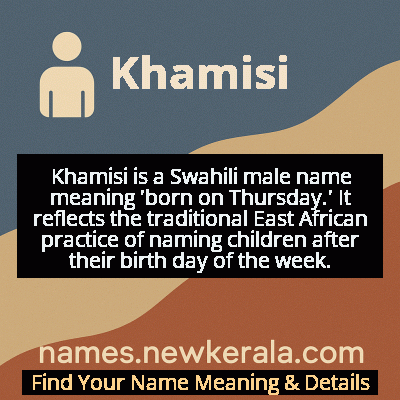Khamisi Name Meaning & Details
Origin, Popularity, Numerology Analysis & Name Meaning of Khamisi
Discover the origin, meaning, and cultural significance of the name KHAMISI. Delve into its historical roots and explore the lasting impact it has had on communities and traditions.
Name
Khamisi
Gender
Male
Origin
African
Lucky Number
7
Meaning of the Name - Khamisi
Khamisi is a Swahili male name meaning 'born on Thursday.' It reflects the traditional East African practice of naming children after their birth day of the week.
Khamisi - Complete Numerology Analysis
Your Numerology Number
Based on Pythagorean Numerology System
Ruling Planet
Neptune (Ketu)
Positive Nature
Intuitive, analytical, spiritual, and inquisitive.
Negative Traits
Secretive, reserved, aloof, and can be overly critical.
Lucky Colours
Green, yellow.
Lucky Days
Monday.
Lucky Stones
Cat’s eye, moonstone.
Harmony Numbers
1, 5, 6.
Best Suited Professions
Scientists, researchers, spiritual leaders, detectives.
What People Like About You
Depth of knowledge, analytical skills, spirituality.
Famous People Named Khamisi
Khamisi Mwinyi
Politician
Tanzanian politician and member of parliament
Khamisi Kondo
Musician
Tanzanian traditional musician preserving Swahili musical heritage
Khamisi Juma
Community Leader
Kenyan community organizer and social activist in coastal regions
Khamisi Ali
Educator
Swahili language teacher and cultural preservationist
Name Variations & International Equivalents
Click on blue names to explore their detailed meanings. Gray names with will be available soon.
Cultural & Historical Significance
In Swahili culture, Thursday-born individuals are traditionally associated with specific characteristics and spiritual qualities. The name Khamisi connects its bearer to a rich maritime trading history where Swahili culture developed through the interaction of Bantu, Arab, Persian, and Indian influences. This name represents more than just a birth marker—it embodies the syncretic nature of Swahili civilization and serves as a living link to ancestral traditions that have been preserved through generations despite colonial influences and modernization.
The cultural importance of Khamisi extends beyond individual identity to community cohesion. In many Swahili communities, knowing a person's day-name provides immediate social context and helps establish relational connections. This naming tradition reinforces the collective memory and cultural continuity that has allowed Swahili civilization to maintain its distinct identity while adapting to changing historical circumstances.
Extended Personality Analysis
Individuals named Khamisi are often perceived as possessing qualities traditionally associated with Thursday-born people in Swahili culture. They are typically seen as diplomatic, balanced, and possessing natural leadership abilities. The name carries expectations of wisdom and mediation skills, with Khamisi individuals often being viewed as peacemakers who can bridge differences between conflicting parties. Their Thursday birth association suggests a personality that combines practicality with spiritual depth, making them well-suited for roles requiring both emotional intelligence and pragmatic decision-making.
In many East African communities, Khamisi is associated with reliability, consistency, and a strong sense of responsibility. These individuals are often expected to be dependable family members and community pillars who honor traditional values while adapting to modern circumstances. The name implies a person who maintains strong connections to their roots while navigating contemporary life, embodying the cultural resilience that characterizes Swahili society. Their Thursday birth connection also suggests an optimistic outlook and the ability to bring people together through shared goals and mutual understanding.
Beyond these cultural associations, Khamisi individuals are often thought to possess a natural curiosity and intellectual depth. The positioning of Thursday in the week—looking back on accomplishments while anticipating future possibilities—suggests a personality that values reflection and forward-thinking. This combination of traditional wisdom and progressive outlook makes Khamisi a name associated with individuals who can honor heritage while embracing innovation and change.
Modern Usage & Popularity
In contemporary times, Khamisi remains a popular name in Swahili-speaking communities, though its usage patterns have evolved. While traditionally given specifically to boys born on Thursdays, modern parents sometimes choose the name for its cultural resonance rather than strict adherence to birth timing. The name maintains strong popularity in coastal regions of Kenya and Tanzania, particularly in families valuing cultural preservation. Urbanization has led to some decline in strict day-based naming, but Khamisi continues to be recognized as a distinctly Swahili name that conveys cultural pride and connection to East African heritage. Digital globalization has also introduced the name to diaspora communities worldwide, where it serves as a marker of cultural identity and connection to ancestral roots. The name's usage in modern times reflects both continuity with tradition and adaptation to contemporary social contexts, demonstrating the dynamic nature of cultural practices in the 21st century.
Symbolic & Spiritual Meanings
Symbolically, Khamisi represents the bridge between tradition and modernity, embodying the enduring strength of cultural identity in a changing world. The name carries metaphorical significance as a marker of time and destiny, suggesting that each individual enters the world with a specific purpose aligned with cosmic rhythms. In broader symbolic terms, Khamisi represents cultural continuity, the preservation of ancestral wisdom, and the harmonious integration of diverse influences that characterizes Swahili civilization. The Thursday association symbolizes preparation and anticipation—positioned between the week's work and the weekend's rest, it represents balance, transition, and the wisdom that comes from understanding multiple perspectives. This symbolic meaning extends to represent the individual's role as a connector between generations, cultures, and historical epochs, embodying the resilience and adaptability that has allowed Swahili culture to thrive for centuries.

